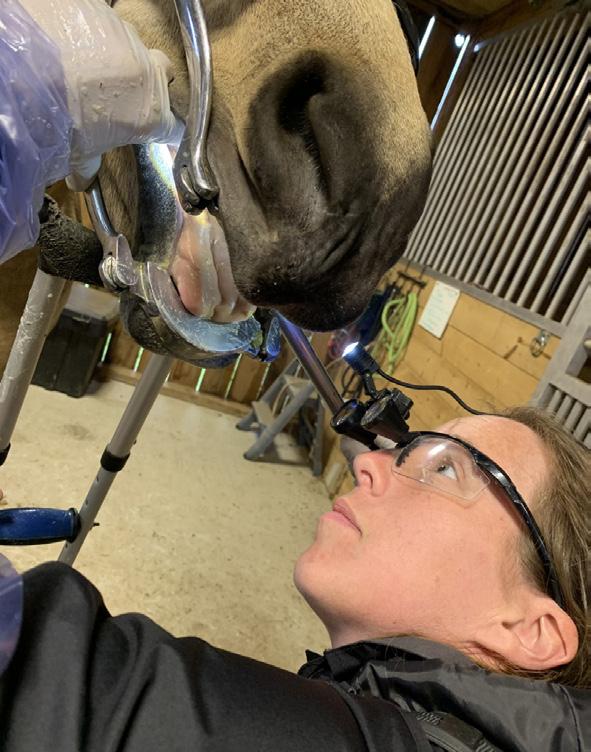UK EQUESTRIAN ATHLETE INITIATIVE LAUNCHES RESEARCH PROJECT IN RESPONSE TO RECENT FINDINGS ABOUT VETERINARIAN MENTAL HEALTH The University of Kentucky Equestrian Athlete (EqA) Initiative, formerly known as the Jockey & Equestrian Initiative, launched an equine care service providers’ (ECSP) research project as a comprehensive survey in April to address equestrian health and wellness. Part of the Sports Medicine Research Institute within UK’s College of Health Sciences, EqA is focused on the health of the equestrian athlete. The team had been putting the project into place prior to the pandemic in response to recent findings related to the mental health of veterinarians. In 2019, when Merck Animal Health released survey results looking at all veterinarians’ mental health, the findings have changed discussions around veterinary medical providers as a key population needing attention. The Merck study reported that younger veterinarians demonstrated increased psychological distress, higher suicidal thoughts and attempts, compared to the general U.S. population. Additionally, 41% of the veterinarians who responded stated they would not recommend going into veterinary sciences as a profession, with the three main reasons being compensation, debt and costs and personal toll of the profession. This survey was a follow-up to a survey from Auburn University and the Centers for Disease Control and Prevention, which found female veterinarian suicides are 2.4 times higher than the general population. This is similar to female veterinary technicians, who are 1.6-2.3 times more likely to commit suicide than the general population. Does animal care type impact these findings? The EqA team is
seeking answers through the ECSP project. The ECSP research project is close to Michaela Keener’s heart, as her eldest sister and professional mentor is a DVM. Keener, MS, is the research administrative coordinator for the Equestrian Athlete Initiative. Running her own practice in their home state of Minnesota, Keener’s sister (Laurelyn Keener) has shared numerous stories of the stresses and variables influencing vets’ mental, physical
THE MERCK STUDY REPORTED THAT YOUNGER VETERINARIANS DEMONSTRATED INCREASED PSYCHOLOGICAL DISTRESS, HIGHER SUICIDAL THOUGHTS AND ATTEMPTS, COMPARED TO THE GENERAL U.S. POPULATION. and financial well-being. Wanting to serve this valuable community, Tumlin and Keener designed a qualitative study to address these social, behavioral and economic factors. The primary goal of this study is to develop a profile and encompassing view of work-life and personal life characteristics and practices. Included in the survey are the topics of stress, fatigue, mental health, vacation engagement, medical and adjunctive care, economic impacts of schooling and social media impacts on wellness perceptions. There are four populations included in the survey, veterinarians, veterinary technicians, farriers and specialists with at least 50% equine clientele. Some of the demographic questions include type of travel,
MAY 2020 | PAGE 3
MARTY WHITEHOUSE, DVM AND UK ALUM, EXAMINES A PATIENT. PHOTO BY KIMBERLY TUMLIN
frequency of non-standard hours, location of services regionally and type of education that service providers have achieved. “It’s important to look at ways to improve the resources available to this population of workers, but we need to understand what differences and similarities each specific subgroup is facing on a regional basis,” Keener said. The information collected will allow researchers to advise professional organizations in order to address some of the issues seen among the different subgroups. Additionally, it will give researchers a base to work off of to continue conducting research needed to help change education, resources and other guidelines to increase health and wellness of equine care service providers. Given the national impact of COVID-19, the team created an optional section to evaluate effects of the pandemic on these populations. The research team hopes to use this information to better characterize the group’s




